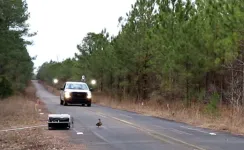(Press-News.org) September 25, 2024 (Washington, DC)—The Kissick Family Foundation Frontotemporal Dementia (FTD) Grant Program, in partnership with the Milken Institute Science Philanthropy Accelerator for Research and Collaboration (SPARC), today announced six research teams awarded two-year grants to advance scientific understanding of FTD, totaling $3 million in new funding for this disease.
This inaugural cycle of the Kissick Family Foundation FTD Grant Program represents a unique philanthropic strategy that specifically targets basic or early-stage translational research projects that focus on those disease cases where the patient lacks a genetic link or strong family history, generally referred to as sporadic FTD. The awards support researchers dedicated to uncovering the biological underpinnings of FTD to foster a better understanding of their etiology, biomarkers, or potential targets for treatment..
FTD refers to a family of neurodegenerative conditions that cause changes in behavior, mood, executive function, language, memory, and motor function. While some genetic causes have been discovered, about 60% of cases are identified as sporadic FTD. Based on brain pathology, FTD could account for as many as 10-20% of all dementia cases. The disease is underdiagnosed, and a true global prevalence estimate is hindered by a general lack of awareness and the complex nature of its detection.
The program’s awardees include teams of researchers from the University of Michigan led by Dr. Sami Barmada, the University of California San Francisco led by Dr. Martin Kampmann, the University of Cambridge led by Dr. Maura Malpetti, the Mayo Clinic led by Dr. Leonard Petrucelli, and the University of Pennsylvania led by Dr. James Shorter. Projects will seek to understand the malfunctioning of proteins in the brain that contribute to FTD, identify potential biomarkers and treatments, and characterize overall disease states and their causes.
"Earlier this year, we lost our father and husband, John Kissick, after a long battle with FTD," said Kathy, Kasey, and Ryan Kissick of the foundation. "We continue his legacy through our work and are inspired by this incredible set of scientists working tirelessly toward a cure for FTD and related dementias. While not in time for John, we are optimistic that significant breakthroughs are on the horizon for the thousands of families affected by this difficult disease."
Through this program, the Kissick Family Foundation is investing in research that accelerates basic discoveries, expedites novel treatment options, and ultimately improves patient outcomes for people living with FTD. Their partnership with SPARC began in 2022 with an analysis of the state of FTD research and funding landscape. The results of those efforts were published in the November 2023 Milken Institute Strategic Philanthropy Giving Smarter Guide, which identified research areas where focused philanthropic capital will accelerate progress and meaningfully enrich the overall landscape.
“Basic research to understand the brain is so critical,” said Cara Altimus, PhD, Managing Director of SPARC. “We are hopeful that this funding will be the start of deepening science’s understanding of the brain, and collaboration among scientists and funders will advance the path to breakthroughs across neurodegenerative diseases.”
A new round of funding is being announced concurrently with these awards which will continue to build a fundamental understanding of sporadic FTD with basic or early-stage translational research. The request for proposals may be found here. One-page letters of intent are being accepted through November 1, 2024. Individual researchers are eligible for up to $500,000 in funding over two years, inclusive of indirect costs. Awardees for this funding cycle should expect to be notified mid-year in 2025.
About the Milken Institute
The Milken Institute is a nonprofit, nonpartisan think tank focused on accelerating measurable progress on the path to a meaningful life. With a focus on financial, physical, mental, and environmental health, we bring together the best ideas and innovative resourcing to develop blueprints for tackling some of our most critical global issues through the lens of what’s pressing now and what’s coming next. For more information, visit https://milkeninstitute.org/.
About the Milken Institute Science Philanthropy Accelerator for Research and Collaboration
The Milken Institute Science Philanthropy Accelerator for Research and Collaboration (SPARC) works to develop, launch, and lead initiatives that fund medical research and invest to accelerate the development of tools and treatments that will bring better health to millions of people. Our expertise lies within a number of medical research fields, including neuroscience, mental health, oncology, rare diseases, and immunology. We partner with philanthropists, leading them through complex medical research and clinical systems and guiding pathways for philanthropy to create a healthy, equitable world.
About the Kissick Family Foundation
The Kissick Family Foundation aims to catalyze change through bold and dynamic philanthropy. They provide critical early support for the leaders, researchers, and entrepreneurs who are finding cures, repairing catastrophic damage, and changing entire fields of study. The foundation invests in cutting-edge scientific research and advocacy for neurodegenerative diseases, with a focus on frontotemporal dementia. They are equally committed to backing transformative ideas in the climate space, specifically ocean-based solutions with the potential to mitigate and reverse harm to the planet.
# # #
END
Kissick Family Foundation, Milken Institute announce $3 million in funding for frontotemporal dementia research
Grants focus on early-stage scientific research to understand the underlying mechanisms of FTD
2024-09-25
ELSE PRESS RELEASES FROM THIS DATE:
How does cancer spread? Follow the map
2024-09-25
Metastatic cancer can be a devastating diagnosis. The cancer is spreading. It may travel to multiple organs in the body. This could mean more pain and ultimately, death.
Unfortunately, just how cancer spreads remains unclear. But now, Cold Spring Harbor Laboratory (CSHL) Professor Adam Siepel and colleagues have a way to better understand that process. New technology developed at Weill Cornell Medicine barcodes cells to track the highways by which prostate cancer spreads throughout the body.
The resulting roadmap shows that most cancer cells actually stay put within the tumor. However, ...
Shrinking AR displays into eyeglasses to expand their use
2024-09-25
Augmented reality (AR) takes digital images and superimposes them onto real-world views. But AR is more than a new way to play video games; it could transform surgery and self-driving cars. To make the technology easier to integrate into common personal devices, researchers report in ACS Photonics how to combine two optical technologies into a single, high-resolution AR display. In an eyeglasses prototype, the researchers enhanced image quality with a computer algorithm that removed distortions.
AR systems, like those in bulky goggles and automobile head-up displays, require portable optical components. But shrinking the typical four-lens AR system to the size of eyeglasses or smaller ...
High academic award for economic geographer Ron Boschma
2024-09-25
Professor Ron Boschma is the first Dutch person to receive the Prix Vautrin Lud, the highest academic award within the field of geography. The award will be presented in Saint-Dié-des-Vosges, France on 6 October. Prior to the award ceremony, Prof. Boschma will give an invited lecture at the Sorbonne University in Paris on 4 October. Boschma was nominated for the award in recognition of his scientific contributions to the field of economic geography, especially for laying the foundations of evolutionary economic geography and his research into regional diversification and innovation policy. The European Union’s regional policy is based in part on his ...
Study reveals mallards' flight responses ineffective in preventing vehicle collisions
2024-09-25
Research Highlights Risk to Both Humans and Wildlife, Suggests Need for New Collision Mitigation Strategies
A recent article published in PeerJ Life & Environment has uncovered insights into how mallards (Anas platyrhynchos) respond to approaching vehicles, revealing that these common waterbirds are poorly equipped to avoid collisions, particularly at high speeds. The research, which used both simulated and real-world vehicle approaches, highlights the urgent need for improved methods to reduce bird-vehicle collisions—events that are not only financially costly but also dangerous to both humans and wildlife.
The study focused ...
Home- vs office-based narrowband UV-B phototherapy for patients with psoriasis
2024-09-25
About The Study: In this randomized clinical trial, home-based phototherapy was as effective as office-based phototherapy for plaque or guttate psoriasis in everyday clinical practice and had less burden to patients.
Corresponding Author: To contact the corresponding author, Joel M. Gelfand, MD, email joel.gelfand@pennmedicine.upenn.edu.
To access the embargoed study: Visit our For The Media website at this link https://media.jamanetwork.com/
(doi:10.1001/jamadermatol.2024.3897)
Editor’s Note: Please see the article for additional information, including other authors, ...
Major boost in carbon capture and storage essential to reach 2°C climate target
2024-09-25
Large expansion of carbon capture and storage is necessary to fulfill the Paris Climate Agreement. Yet a new study led by Chalmers University of Technology, in Sweden and University of Bergen, in Norway, shows that without major efforts, the technology will not expand fast enough to meet the 2°C target and even with major efforts it is unlikely to expand fast enough for the 1.5°C target.
The idea behind carbon capture and storage (CCS) technology is to capture carbon dioxide then store it deep underground. Some applications of CCS, such ...
‘Invisible forest’ of algae thrives as ocean warms
2024-09-25
An “invisible forest” of phytoplankton is thriving in part of our warming ocean, new research shows.
Phytoplankton are tiny drifting organisms that do about half of the planet’s “primary production” (forming living cells by photosynthesis).
The new study, by the University of Exeter, examined phytoplankton at the ocean surface and the “subsurface” – a distinct layer of water beneath – to see how climate variability is affecting them.
Published in the journal Nature Climate Change, the findings show these two communities are reacting differently.
Over the last decade, the total “biomass” (living material) of subsurface ...
How do rare genetic variants affect health? AI provides more accurate predictions
2024-09-25
Whether we are predisposed to particular diseases depends to a large extent on the countless variants in our genome. However, particularly in the case of genetic variants that only rarely occur in the population, the influence on the presentation of certain pathological traits has so far been difficult to determine. Researchers from the German Cancer Research Center (DKFZ), the European Molecular Biology Laboratory (EMBL) and the Technical University of Munich have introduced an algorithm based on deep learning that can predict the effects of rare genetic variants. The method allows persons with high risk of disease to be distinguished more precisely and facilitates the identification ...
Replacing hype about artificial intelligence with accurate measurements of success
2024-09-25
The hype surrounding machine learning, a form of artificial intelligence, can make it seem like it is only a matter of time before such techniques are used to solve all scientific problems. While impressive claims are often made, those claims do not always hold up under scrutiny. Machine learning may be useful for solving some problems but falls short for others.
In a new paper in Nature Machine Intelligence, researchers at the U.S. Department of Energy’s Princeton Plasma Physics Laboratory (PPPL) and Princeton University performed a systematic review of research comparing machine learning to traditional methods for solving ...
Researchers harness AI to repurpose existing drugs for treatment of rare diseases
2024-09-25
There are more than 7,000 rare and undiagnosed diseases globally.
Although each condition occurs in a small number of individuals, collectively these diseases exert a staggering human and economic toll because they affect some 300 million people worldwide.
Yet, with a mere 5 to 7 percent of these conditions having an FDA-approved drug, they remain largely untreated or undertreated.
Developing new medicines represents a daunting challenge, but a new artificial intelligence tool can propel the discovery of new therapies from existing medicines, offering hope for patients with rare and neglected conditions and for the clinicians who treat them.
The AI model, called TxGNN, is the first one ...
LAST 30 PRESS RELEASES:
Power in motion: transforming energy harvesting with gyroscopes
Ketamine high NOT related to treatment success for people with alcohol problems, study finds
1 in 6 Medicare beneficiaries depend on telehealth for key medical care
Maps can encourage home radon testing in the right settings
Exploring the link between hearing loss and cognitive decline
Machine learning tool can predict serious transplant complications months earlier
Prevalence of over-the-counter and prescription medication use in the US
US child mental health care need, unmet needs, and difficulty accessing services
Incidental rotator cuff abnormalities on magnetic resonance imaging
Sensing local fibers in pancreatic tumors, cancer cells ‘choose’ to either grow or tolerate treatment
Barriers to mental health care leave many children behind, new data cautions
Cancer and inflammation: immunologic interplay, translational advances, and clinical strategies
Bioactive polyphenolic compounds and in vitro anti-degenerative property-based pharmacological propensities of some promising germplasms of Amaranthus hypochondriacus L.
AI-powered companionship: PolyU interfaculty scholar harnesses music and empathetic speech in robots to combat loneliness
Antarctica sits above Earth’s strongest “gravity hole.” Now we know how it got that way
Haircare products made with botanicals protects strands, adds shine
Enhanced pulmonary nodule detection and classification using artificial intelligence on LIDC-IDRI data
Using NBA, study finds that pay differences among top performers can erode cooperation
Korea University, Stanford University, and IESGA launch Water Sustainability Index to combat ESG greenwashing
Molecular glue discovery: large scale instead of lucky strike
Insulin resistance predictor highlights cancer connection
Explaining next-generation solar cells
Slippery ions create a smoother path to blue energy
Magnetic resonance imaging opens the door to better treatments for underdiagnosed atypical Parkinsonisms
National poll finds gaps in community preparedness for teen cardiac emergencies
One strategy to block both drug-resistant bacteria and influenza: new broad-spectrum infection prevention approach validated
Survey: 3 in 4 skip physical therapy homework, stunting progress
College students who spend hours on social media are more likely to be lonely – national US study
Evidence behind intermittent fasting for weight loss fails to match hype
How AI tools like DeepSeek are transforming emotional and mental health care of Chinese youth
[Press-News.org] Kissick Family Foundation, Milken Institute announce $3 million in funding for frontotemporal dementia researchGrants focus on early-stage scientific research to understand the underlying mechanisms of FTD






